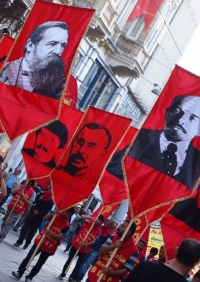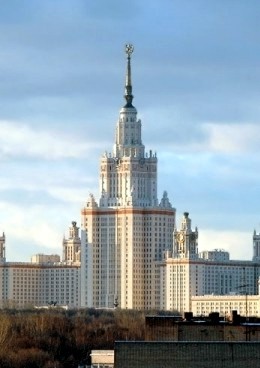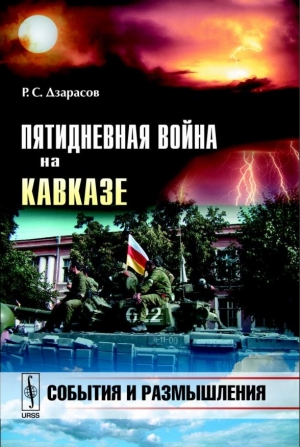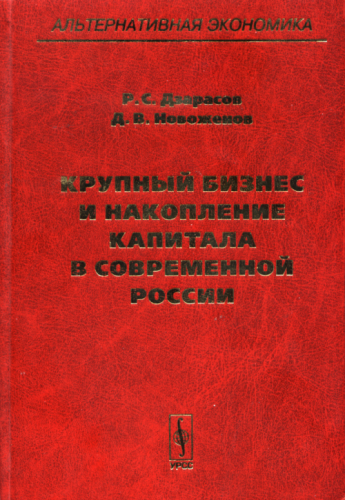Презентация книги The Conundrum of Russian Capitalism: The Post-Soviet Economy in the World System
Dr. Ruslan Dzarasov, Senior research fellow at the Central Economics and Mathematics Institute of the Russian Academy of Sciences, presented his new book “The Conundrum of Russian Capitalism: The Post-Soviet Economy in the World System” in the Winstanley Lecture Theatre of the famous Trinity College.
More than 25 people attended the talk, among them, well-known Professor David Lane, interested in Russian economics and politics. Ruslan traced historical roots of modern Russian capitalism starting from Soviet bureaucracy and intelligentsia. He discussed various issues of the process of privatisation and “wild capitalism” of 1990′s and, finally, gave an overview of modern Russian economics and its problems including unfair assets management using offshore schemes.
After talk, Ruslan answered several questions (the most original one was about Bitcoin and whether it could help Russian economics) and then we continued discussion with some refreshments. Ruslan represented his analysis from post-keynesian position which is somewhat opposite to the wide-spread neoliberal model of economics. This was very interesting and inspiring evening with live discussion, thanks everybody for coming!
Источник: Russian Cambridge
Transcript of The Conundrum of Russian Capitalism
Senior research fellow, CEMI RAS, Moscow
The Conundrum of Russian Capitalism The Post-Soviet Economy in the World System
Cambridge University Russian Society
1 February 2014
Vladimir Pozner prominent Russian television journalist
Talk-show: “Do we need capitalism?”
The fixed assets stock of Russian economy became obsolete. In 1992-2011 the average longevity of equipment grew from 12 to 23-24 years. The share of machines and equipment exceeding 20 years of its lifespan amounts to 68 per cent of the whole stock
Obsolete fixed capital stock
4. Inferiour investments
investment of more than 80 per cent of enterprises was insufficient even for maintaining the current level of production, capable of securing only partial improvements or only maintain their productive capacities.
In the end of 2012 demand two-three times less expenditures per unit of investment funds, than the strategies assuming new construction and expansion of productive capacities of Russian enterprises
Thus, it is an empirical fact that in twenty years of market reforms investments of Russian companies are insufficient neither to arrest the shrinking of the fixed capital stock, nor to stop its technological degeneration.
Inferiour investment
'Cheap' investments
1. The Genesis of Russian Capitalism in the World System
David Lane
(a) the “administrative class” - people who exercised bureaucratic control over production, education and science;
(b) the “appropriating class” - the intelligentsia who had an interest in using market mechanisms as a way to benefit from their professional knowledge.
Private appropriation behind the facade of the 'really existing socialism'
To these two social categories can be added the black-market entrepreneurs who had gradually developed within the pores of the Soviet system.
“Managerial Revolution”: separation of ownership from management Gardiner Means (1896-1988)
Separation of ownership from management expands the corporation’s time horizon in the long run, making maximization of long-term growth its prime objective. Alfred Eichner (1937-1988)
and “Revolution of Shareholders”
STAGFLATION
Calculated from: Federal Reserve Bank, Flow of Funds Tables, 08 March 2012, Table B 102 ‘Nonfinancial Corporate Business’ (Rows 2 and 6).
Financial Assets as a Share of Tangible Assets of the US Non-Financial Corporations, in %
“Accumulation by dispossession” means redistribution of existing value, rather than creation of new value.
“All the features of primitive accumulation that Marx mentions have remained powerfully present within capitalism’s historical geography up until now”.
(Harvey D., 2003, The New Imperialism, Oxford, New York: Oxford University Press.).
David Harvey “Accumulation by dispossession”
Megacorporation - long-term growth maximizer
3. Radical Market Reforms and Peripherisation of the former USSR
In course of the turmoil of the 1990s industrial share in total value added of the CIS countries on average declined in the CIS countries from 38 to 29 per cent; manufacturing declined in favour of raw extracting industries; economies moved to more simple and primitive patterns.
Decline of Industry
Source: Doklad O Polozhenii v Oblasti Oplaty Truda v Gosudarstvakh Sodrujestva, Solidarnoy Pozitsii I Deistviyakh Profsoyuzov po Zaschiter Interesv Trudyaschikhsya, 2008, (Moscow: Vseobschaya Konfederatsiya Truda), p. 5.
According to the Global Wealth Report, she ‘has the highest level of wealth inequality in the world (italics are mine – R.D.), apart from small Caribbean nations with resident billionaires. Worldwide, there is one billionaire for every USD 170 billion in household wealth; Russia has one for every USD 11 billion. Worldwide, billionaires collectively account for 1%–2% of total household wealth; in Russia today 110 billionaires own 35% of all wealth’.
Shorrocks, A., Davies, J., & R. Lluberasis, (2013) Global Wealth Report, (Zurich: Publisher Credit Swiss AG), p. 53.
Russia is an exemplar case of inequality
4. Russian Model of Corporate Governance
Waves of redistribution of the ‘property rights’ regularly sweep over the Russian economy. Their prime instrument is hostile takeovers, including wide application of raiding.
Fundamental Instability of Insider Control
Insider Rent is an income appropriated by big insiders due to their control over the firm’s financial flows.
The ways of rent-extraction
Prices less than the market level
Market prices
Off-shore figure-head companies
Profits
Private accounts of big insiders in off-shore sites
Cash
'Foreign' investments
Western financial markets
Savings
Social conflicts at Russian enterprises
Rent extraction violates the rights of: minority shareholders, rank-and-file managers, hired labour
It can be derived from the above that modern
Highly authoritarian business
5. The War of Big Insiders: a Case-Study JSC Volgogradsky "Chimprom"
Struggle of big insiders for control over the JSC Volgogradsky "Chimprom"
Struggle of Mazepin and Levitsky-Vekselberg Groups of Big Insiders for Control of the Chemical Industry
Profits and Losses of Chimprom
Short-term time orientation and a large scale rent extraction caused a deficient investment strategy. Chimprom’s big insiders chose in favour of cheap investment projects of inferior quality with relatively short pay-back periods. Wear and tear of fixed assets of JSC "Chimprom" in whole in 2005 amounted to a staggering figure of 80%.
Thank you for attention!
See more on the nature of the modern Russian social system in the book ‘The Conundrum of Russian Capitalism’







Добавить комментарий